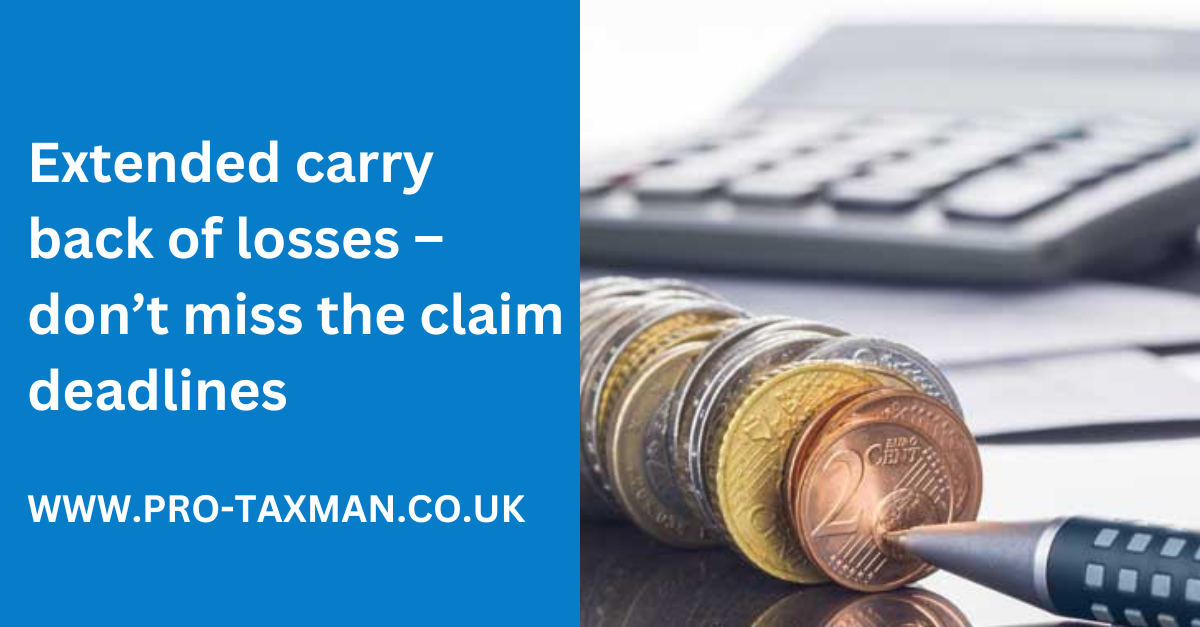To help businesses that suffered losses during the Covid-19 pandemic, temporary measures were introduced to increase the period for which certain losses could be carried back. This is helpful as it enables businesses to obtain relief for those losses earlier, generating a useful tax repayment at times when the business may be suffering from cash flow difficulties.
Relief is available to both unincorporated business and companies, although the mechanics of the relief is different. To take advantage of the extended carry back period, the relief must be claimed by the relevant deadline.
Unincorporated businesses
The extended carry-back rules apply to losses for the 2020/21 and 2021/22 tax years. Under the rules, unrelieved losses can be carried back and set against profits from the same trade for the three years before the tax year of the loss. The extended rules apply where a claim has been made to relieve the loss against the general income of the year of the loss and/or the previous tax year, and the loss has not been fully relieved by that claim. Losses carried back under the extended rules are set against the trading profits of a later tax year before that of an earlier tax year. Losses carried back under the extended rules are capped at £2 million for each loss-making tax year within the scope of the relief.
If a business wishes to use the extended carry-back rules in respect of a 2020/21 loss, it must claim by 31 January 2023. The deadline to claim relief for a 2021/22 loss under the extended carry back rules is 31 January 2024. Claims are normally made in a tax return, but a stand-alone claim can be made where the claim affects more than one tax year.
Example
A sole trader makes a loss in 2020/21. He has no other income in that year. He makes a claim for sideways relief to carry back the loss against his general income for 2019/20. If he wishes to take advantage of the extended carry-back rules to carry back any unrelieved loss against trading profits of 2018/19 and, where loss is not fully relieved, against trading profits of 2017/18, he must claim by 31 January 2023.
It should be noted that the claim cannot be tailored to prevent personal allowances from being wasted. Where this will occur, consideration should be given to whether it would be preferable to carry the loss forward instead and set it against future trading profits.
Companies
Under normal rules, a company can carry back a loss for an accounting period back one year against the profits of the previous accounting period. Under the extended carry-back rules, losses for accounting periods ending between 1 April 2020 and 31 March 2022 can be carried back up to three years. Losses must be set against the profits of a more recent accounting period before those of an earlier accounting period. A cap of £2 million applies to losses for accounting periods ending between 1 April 202 and 31 March 2022 which can benefit from the extended carry-back. A separate £2 million cap applies to losses for the accounting period ending between 1 April 2021 and 31 March 2022.
Claims must be made within two years of the end of the accounting period in which the loss arose.
Example
A company prepares accounts to 31 March each year. It made a loss in the year to 31 March 2021. Under normal rules, the loss can be carried back against profits for the year to 31 March 2020. If the loss is unrelieved, a claim can be made under the extended carry back rules to set the loss first against the profits of the year to 3 March 2019 and, if still not fully relieved, against the profits of the year to 31 March 2018.
The claim must be made by 31 March 2023.
Need professional accounting service or accounting advice? Contact us to book a 15-min Free Consultation with us today.
To find out more please follow us on Facebook, Twitter, or LinkedIn. Feel free to contact us on 0333 006 4847 or request a call back by texting 075 6464 7474

